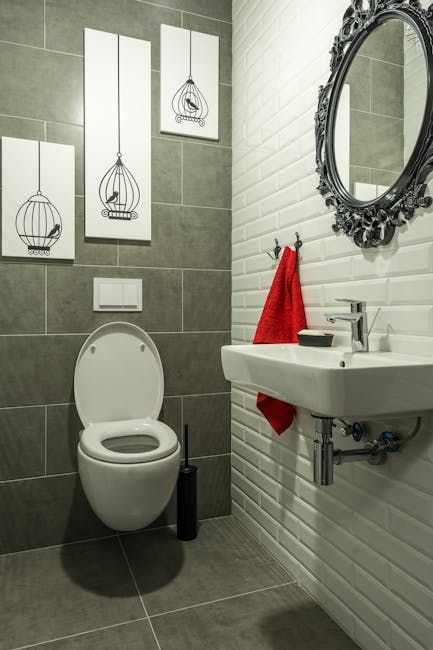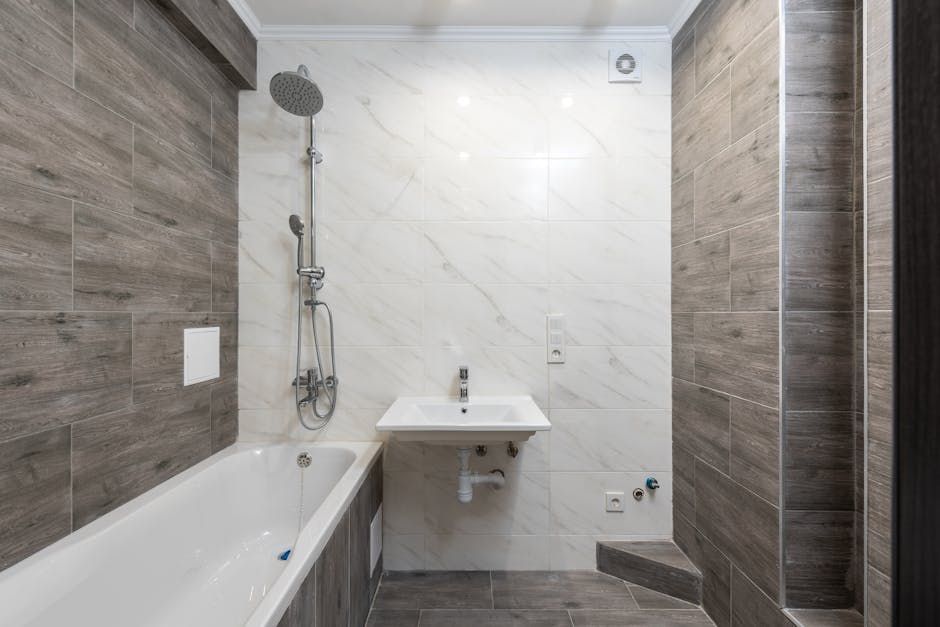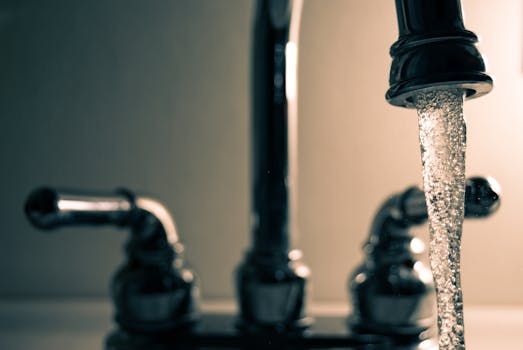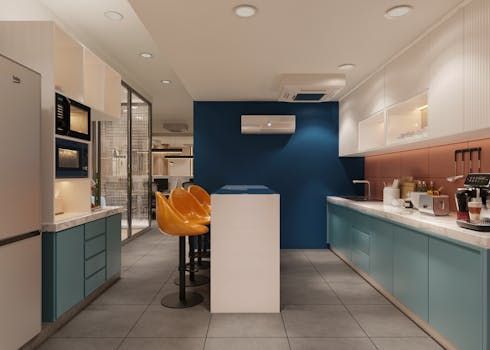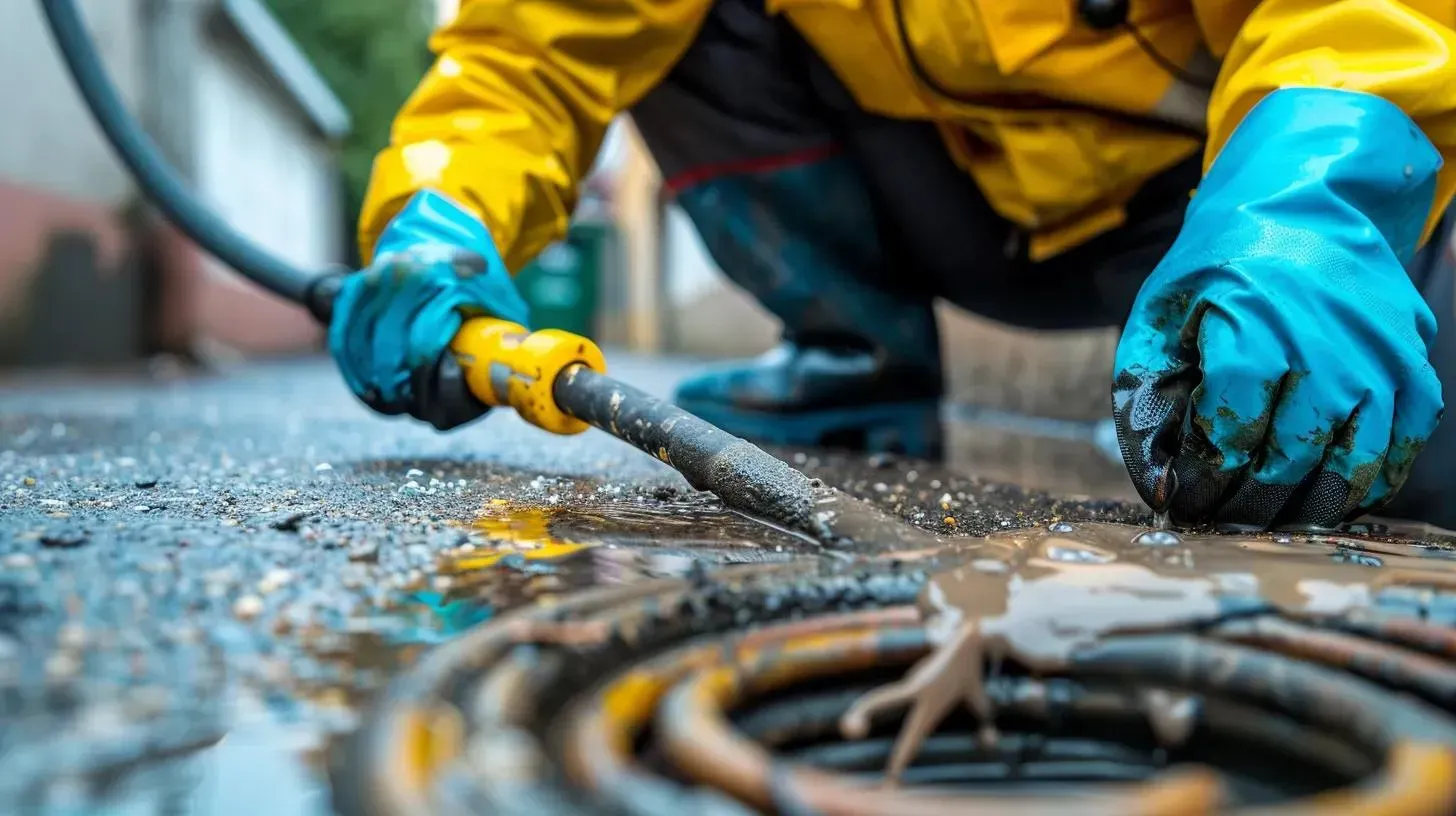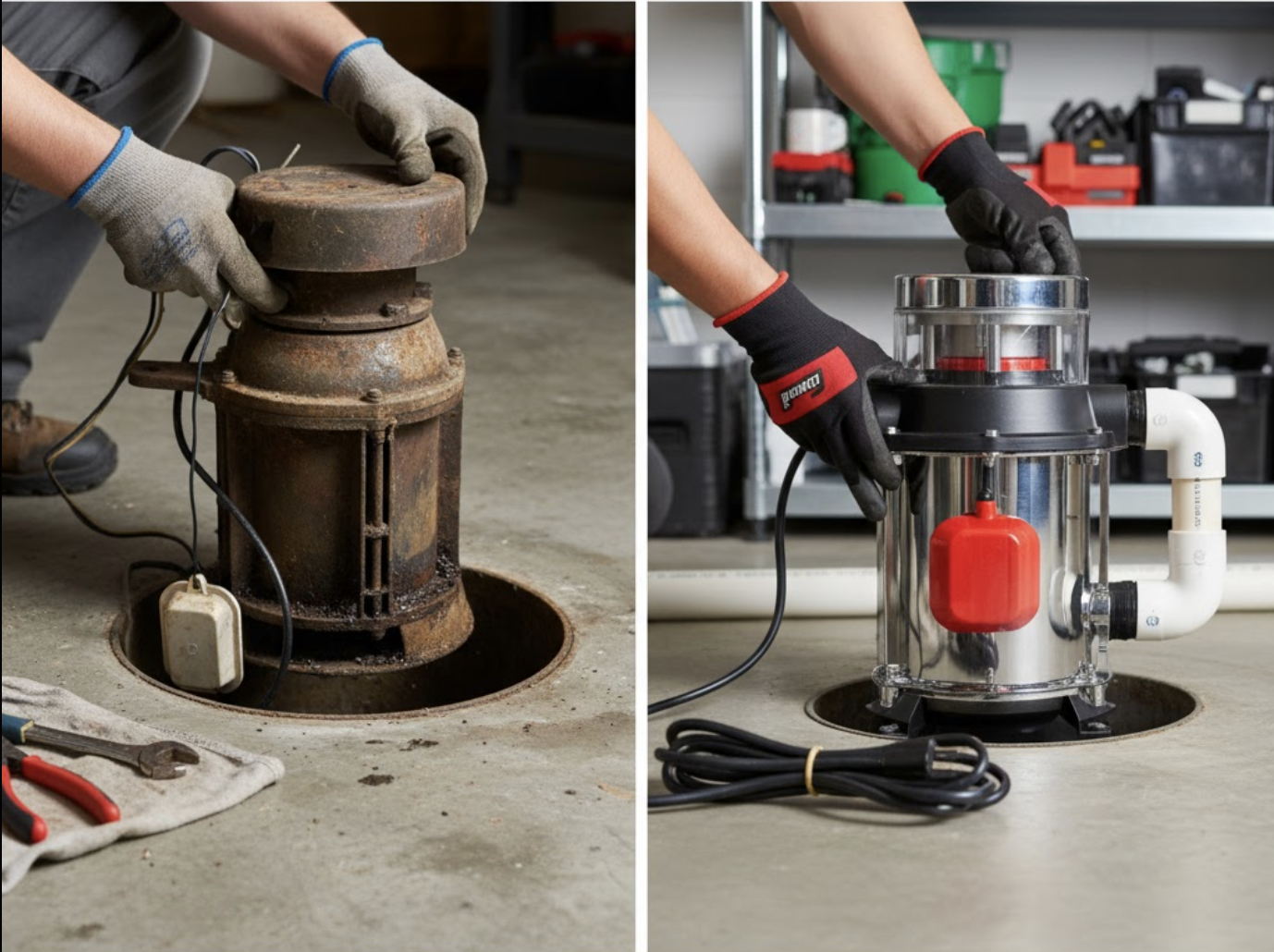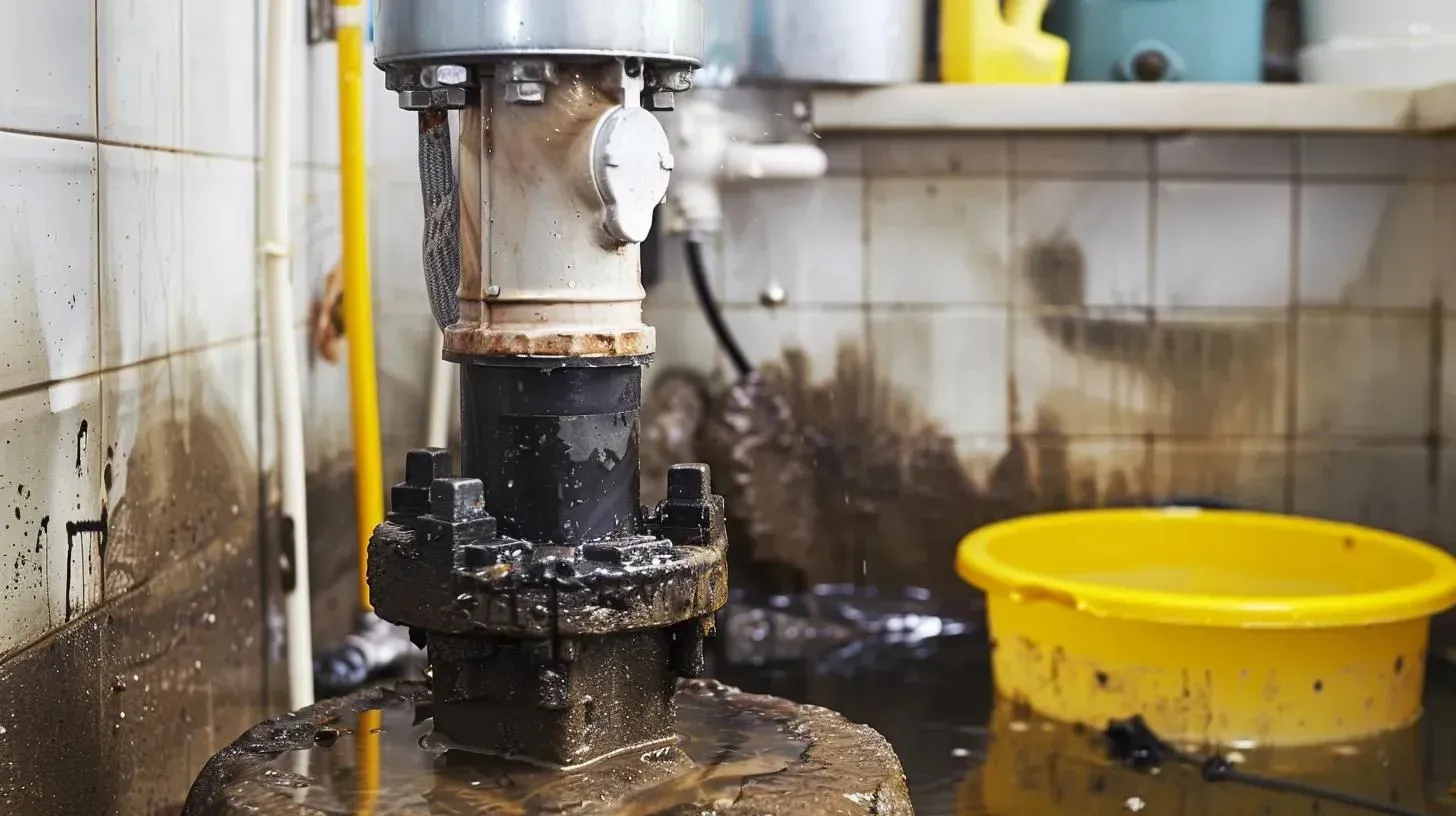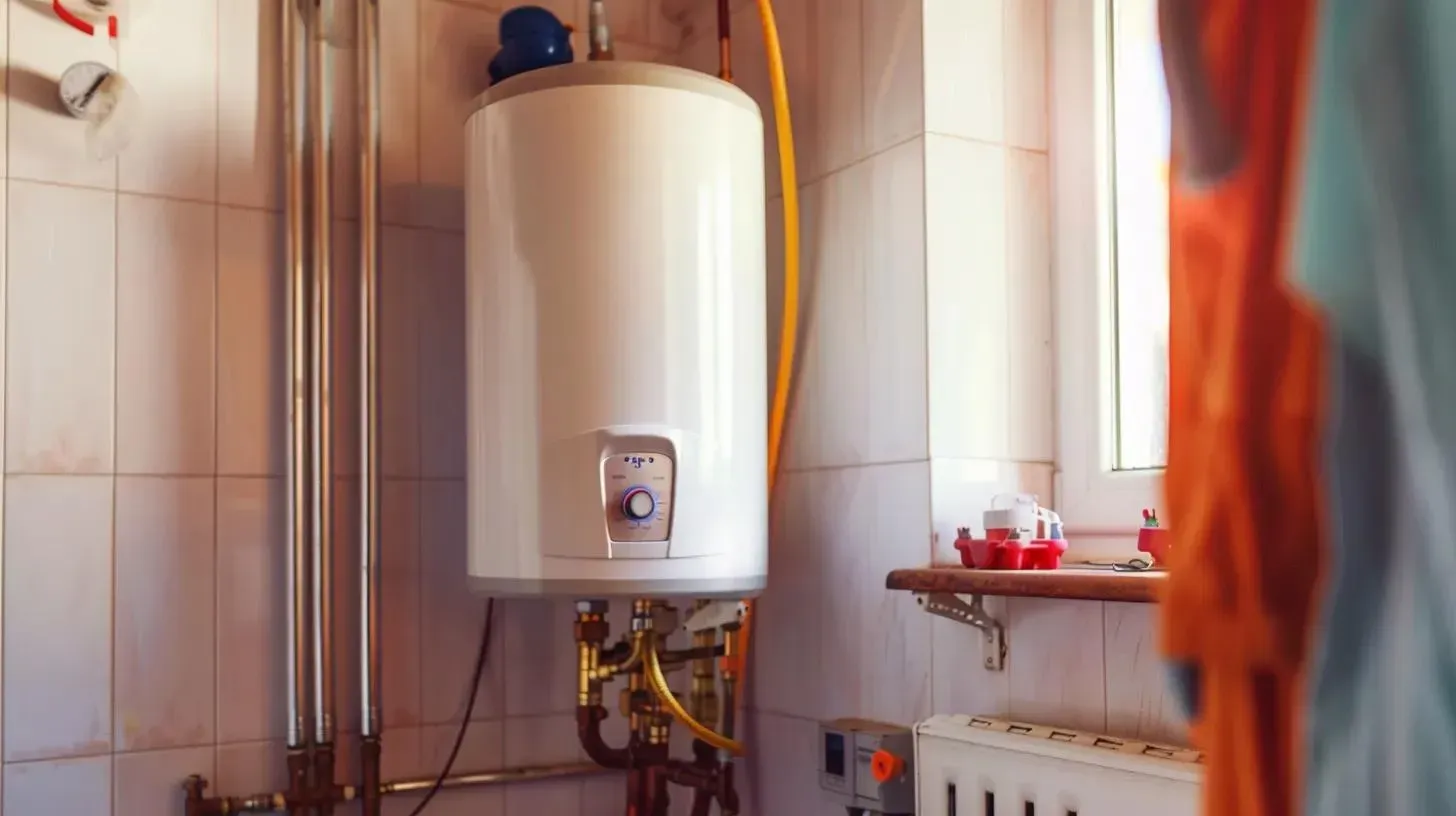How to Fix a Clogged Drain Fast by Using Simple Solutions
The Frustration of Clogged Drains: Fast Solutions
We've all been there – you're rushing to get ready for work, and suddenly you notice water pooling around your feet in the shower. Or maybe you're cleaning up after dinner when the kitchen sink refuses to drain. That sinking feeling (pun intended) is all too familiar when facing a clogged drain.
Let me share some clogged drain solutions that can save your day. For those in a hurry, here's the quick fix toolkit:
Pour boiling water directly down the drain for minor clogs. For something stronger, try the baking soda and vinegar method – half a cup of each, wait 15-20 minutes, then flush with hot water. When things get stubborn, a plunger with a tight seal and vigorous pumping often does the trick. For more resistant clogs, a drain snake can hook and remove the debris. As a last resort, carefully follow the directions on a chemical cleaner.
That gurgling sound when water drains slowly isn't just annoying – it's your plumbing crying for help. And that unpleasant odor? It's a warning sign you shouldn't ignore. Left untreated, clogs don't just disappear – they get worse, potentially leading to damaged pipes, water backups, and repairs that can hurt your wallet.
"Nothing is more frustrating than a clogged drain. More than just an inconvenience—they can be a sign of trouble in your home's plumbing system," notes plumbing experts who tackle these issues daily.
Most clogs develop gradually as hair, soap scum, grease, and food particles build up on pipe walls. The silver lining? You can resolve many clogs quickly with simple household items before they escalate into problems requiring professional intervention.
I'm Mike Martinez, owner of Accountable Home Plumbing, and I've spent over a decade providing effective clogged drain solutions to homeowners across Denver. I've seen how quick action using the right techniques can save you time, money, and a whole lot of frustration.
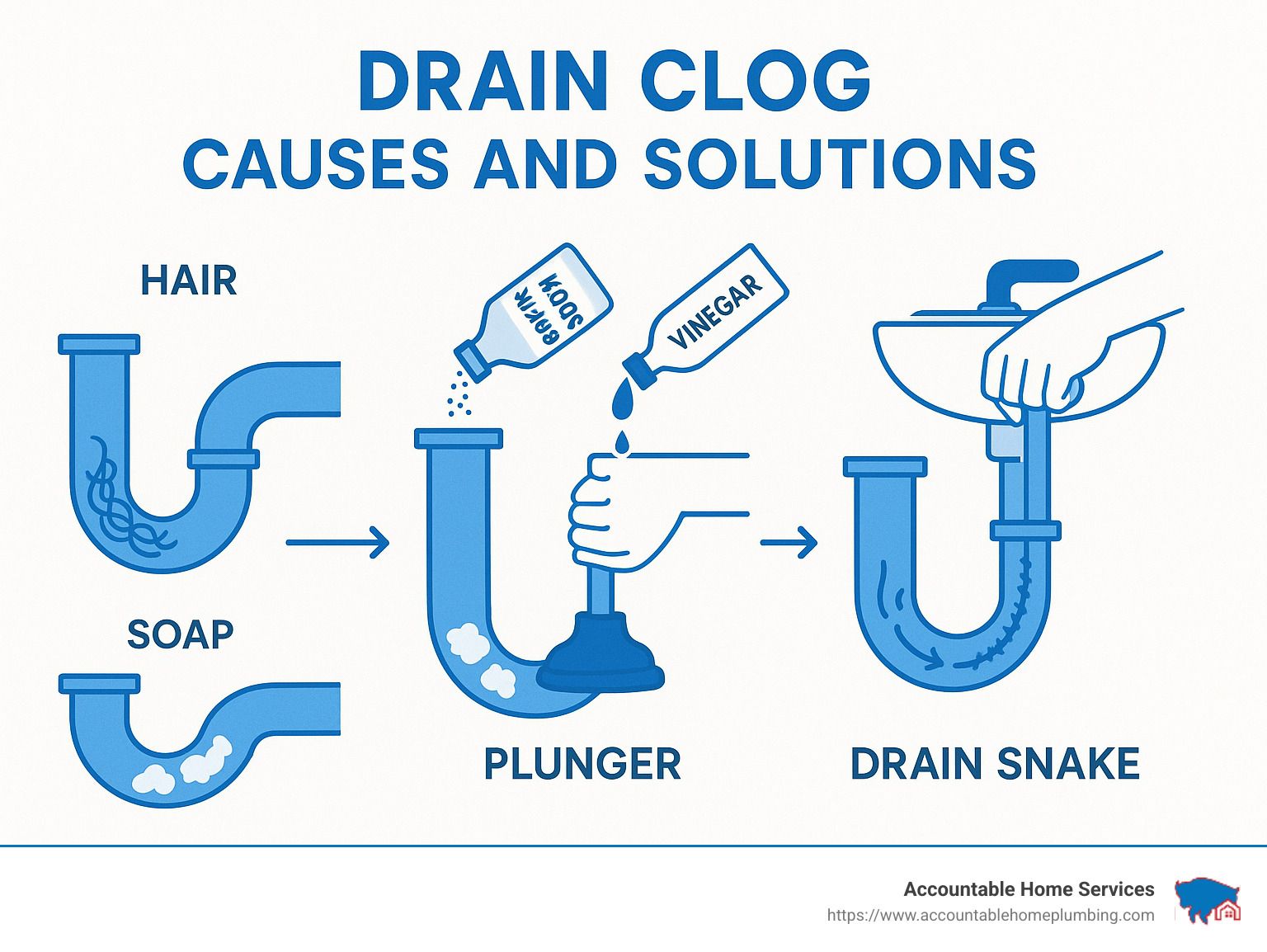
Why Speed Matters
When it comes to dealing with clogged drains, procrastination is not your friend. The longer you wait, the more complicated the problem becomes – and your wallet won't thank you either. Here's why you should tackle drain problems as soon as you notice them:
Water that refuses to drain isn't just inconvenient – it's a health hazard. That standing water quickly becomes a breeding ground for bacteria and mold, potentially causing respiratory issues and other health problems for your family.
What starts as a simple clog can lead to costly repairs down the line. The buildup creates pressure and can cause pipe corrosion, leaks, or even burst pipes if left unchecked. What might have been a simple $5 fix can suddenly become a plumbing emergency.
Perhaps most concerning is the risk of water damage. When severely clogged drains overflow, they can damage your flooring, cabinetry, and drywall – potentially leading to thousands in repair costs and the headache of home renovations you weren't planning.
In my years serving the Denver Metro area, I've seen countless situations where homeowners waited too long to address a simple clog, turning a minor inconvenience into a $500+ emergency call. Trust me when I say a little prevention goes a long way when it comes to your home's plumbing health!
Clogged Drain Solutions at a Glance
That moment when water refuses to go down the drain can ruin anyone's day. Whether you're washing dishes or stepping out of the shower, a clogged drain is never welcome. But before you reach for the phone or harsh chemicals, let's understand what's actually causing the problem.
In my years of helping Denver homeowners, I've seen it all. Hair clumps woven together like tiny nets in bathroom drains. Grease buildup forming stubborn barriers in kitchen pipes after years of washing pans. Food scraps creating blockages even in sinks with garbage disposals. Soap scum leaving sticky residue that catches everything else flowing down. Tree roots sneaking into outdoor lines seeking moisture. And in our Denver homes with hard water, mineral scale gradually narrowing pipes over time.
Early Warning Signs
Your drains will usually give you plenty of warning before completely stopping up. Listen and look for these telltale signals:
Those gurgling sounds when water drains aren't just annoying—they're actually air bubbles trying to escape past a partial blockage. If your morning shower leaves you standing in a puddle due to slow drainage, that's your pipes telling you they're struggling. Notice foul odors wafting up from your sink? That's trapped debris beginning to decompose inside your plumbing. And perhaps most concerning is water back-up, where using one fixture causes water to appear in another—a clear sign of a serious blockage.
As Gene Cunningham, a plumbing expert, often says: "A bathtub or sink clog can usually be cleared with a small 15-foot manual hand snake." But timing matters—catch it early before that clog becomes too compacted and stubborn.
Common Causes & Where They Happen
Your home has different drain enemies depending on which room you're in:
In the kitchen sink, the biggest troublemakers are cooking oils and grease that seem harmless when warm and liquid but solidify like candle wax in your pipes. Those pasta scraps, coffee grounds, and rice that expand with water aren't doing you any favors either.
Bathroom drains fight a constant battle with hair—especially in showers and tubs. Add soap scum, toothpaste residue, and those fancy bath bombs, and you've got a recipe for sluggish drains.
Don't forget the laundry drain which deals with lint from clothing, detergent buildup, and tiny fabric pieces that slip through your washing machine's filter.
Outside, your outdoor drains face nature's challenges—tree roots that can sense water through the tiniest pipe cracks and grow toward it, fallen leaves, and soil washed in by heavy Denver rain and snowmelt.
As DIY cleaning experts like to point out, "Those bubbles you see when mixing baking soda with vinegar? They can actually help you clear your clogged drain pipes!" Understanding these common culprits is your first step toward choosing the right clogged drain solutions for your specific situation.
Fast DIY Methods to Unclog Any Drain
When that water starts backing up in your sink, panic can set in quickly. But before you reach for the phone to call a plumber, take a deep breath. Many clogs can be tackled with items you already have around your home. Let's explore these clogged drain solutions that can save both your pipes and your wallet.
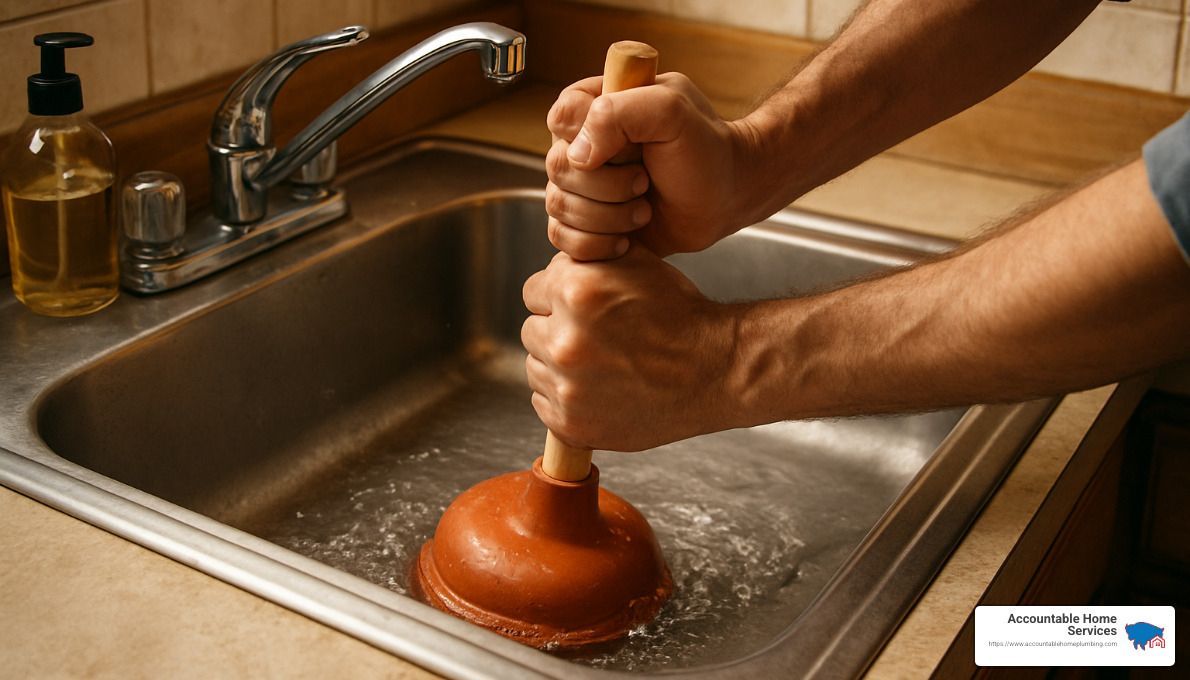
Hot Water & Dish Soap Hack
Ever wonder why dish soap cuts through greasy pans so easily? That same grease-fighting power makes it perfect for kitchen sink clogs. This simple method is often all you need for minor grease blockages.
Start by boiling a full kettle of water. While it's heating up, squirt a generous amount of dish soap directly down your drain. When the water's ready, pour it down slowly but steadily. The hot water melts the grease while the dish soap breaks down those fatty deposits – a perfect one-two punch. Wait about 5 minutes, then flush with cold water. This temperature shock helps dislodge any remaining loosened debris.
Just a word of caution though – if you have PVC pipes, skip the boiling water as extreme heat can warp or damage them. This method works best with metal pipes and is particularly effective for kitchen clogs where cooking oils are the usual suspects.
Baking Soda & Vinegar: Classic Clogged Drain Solutions
This dynamic duo has been clearing drains for generations, and it's not just an old wives' tale – there's real science behind it. When baking soda (a base) meets vinegar (an acid), they create a bubbling reaction that can help break up clogs naturally.
To try this method, pour about half a cup of baking soda directly into your drain. Follow immediately with half a cup of white vinegar, then quickly cover the drain with a plug or cloth. The covering is important – it keeps all that bubbling action working on your clog instead of just fizzing up into your sink. Let this natural chemistry experiment work for about 15-20 minutes, then flush thoroughly with hot (not boiling) water.
"When baking soda meets vinegar, they react to form carbon dioxide bubbles that break up clogs; boiling water then uses added pressure and gravity to flush debris," explains George Calabrese, a plumbing professional. Best of all, this method is completely septic-safe and environmentally friendly, making it a smart first option before trying chemical solutions.
For stubborn clogs, repeat the process 2-3 times. Some homeowners even add half a cup of salt to the baking soda for extra abrasive power on tough blockages. For more information on this method, check out Good Housekeeping's guide to the best drain cleaners which includes natural solutions.
Mastering the Plunger
That humble plunger sitting beside your toilet might be the most underappreciated tool in your home. With proper technique, it's incredibly effective for clearing clogs – but most people don't use them correctly.
First, make sure you're using the right plunger for the job. Cup-shaped plungers are designed for flat surfaces like sinks, while flanged plungers work better for toilets. For sink clogs, add enough water to cover the plunger cup, then position it directly over the drain to create a tight seal. A pro tip that makes a huge difference: apply a thin layer of petroleum jelly to the rim of the plunger for an even better seal.
Don't forget to cover any overflow openings with a wet cloth – this focuses all the pressure directly on the clog. Now plunge vigorously for about 15-30 seconds using straight up-and-down motions. When you're done, test the drain by running water.
"A plunger is an effective way to unclog a kitchen sink or bathtub drain," confirms Brian Shaunfield, a plumbing expert. If you have a double sink, be sure to seal off the second drain completely to direct all the pressure where it's needed most.
Using a Plumbing Snake Safely
When simpler methods fail, it might be time to bring in the snake – the drain snake, that is. This flexible tool can reach deep into pipes to hook and remove stubborn clogs that plungers can't touch.
To use a drain snake effectively, first remove any visible drain cover or stopper. Insert the snake into the drain until you feel resistance – that's likely your clog. Rotate the handle clockwise to hook onto the blockage, then slowly pull the snake back out, bringing the clog with it. Finish by running hot water to flush any remaining debris.
Drain snakes are particularly effective for hair clogs in bathroom sinks and showers. The Vastar Drain Snake is highly recommended by Good Housekeeping experts as a chemical-free solution that can clear hair clogs in seconds. For deeper blockages, you might need a longer, motorized auger, though these require more skill to use without damaging your pipes. You can find quality drain snakes on Amazon with various options for different types of clogs.
"Using a plumbing snake on your clogged drain pipes should be reserved for more severe issues; consider professional help if you are unsure about proper usage!" When in doubt, it's better to call experts like our team at Accountable Home Plumbing rather than risk pipe damage.
When to Try Enzymatic Packets
Not all heroes wear capes – some come in small packets of beneficial bacteria. Enzymatic cleaners offer a gentler, more environmentally friendly approach to drain maintenance and slow-developing clogs.
These biological cleaners use special bacteria and enzymes that actually digest organic matter like hair, food, grease, and soap scum. While they work more slowly than harsh chemicals (typically overnight), they're much safer for your pipes, septic system, and the environment.
For best results, choose a drain-specific enzymatic cleaner like Bio-Clean, follow the package directions carefully, and pour directly down the drain. Let it work its magic overnight – typically 6-8 hours – then flush with hot water in the morning. Bio-Clean Bacteria Septic Cleaner is particularly recommended for monthly maintenance and is safe for use in toilets and garbage disposals.
One of the unique benefits of enzymatic cleaners is that they continue working beyond the initial application. When used regularly (monthly is ideal), they help prevent future buildup, making them excellent for preventative maintenance. Many Denver homeowners in older neighborhoods find that regular enzymatic treatments help keep their aging pipes flowing freely year-round.
Picking the Safest Drain Cleaner for Your Pipes
When your plunger and baking soda tricks have failed, commercial drain cleaners might be your next step. But before you grab the first bottle you see at the store, it's worth understanding which products will solve your problem without creating new ones.
As a plumber who's seen countless damaged pipes from harsh chemicals, I can tell you that choosing the right cleaner makes all the difference. Your pipes—and wallet—will thank you for taking a few minutes to make an informed choice.
"I've seen $20 drain cleaners turn into $2,000 pipe replacements," is something we often tell our Denver customers who've used the wrong product repeatedly.
Pros & Cons: Chemical vs Enzymatic
Chemical drain cleaners work through brute force—they essentially burn through clogs using powerful chemical reactions. Enzymatic cleaners, on the other hand, use beneficial bacteria that eat away at organic matter.
Chemical cleaners work fast—usually within 15-30 minutes—and you can find them at any grocery store. They require no physical effort beyond pouring and waiting. For truly stubborn clogs, they can be effective when nothing else works.
But here's the downside: they're incredibly harsh. With repeated use, they can corrode and weaken your pipes, especially older ones. They're toxic to people and pets (those warning labels aren't just for show), harmful to the environment, and can generate dangerous heat and fumes in your home. If you have a septic system, chemical cleaners can disrupt the beneficial bacteria that keep your system functioning.
Enzymatic cleaners offer a gentler alternative. They're safe for all pipe types, won't harm your family or pets, and actually help prevent future clogs by leaving beneficial bacteria behind. They're also septic-safe and environmentally friendly.
The trade-off? Patience. Enzymatic cleaners typically take hours or even overnight to work. They may require multiple treatments for tough clogs and tend to cost more upfront than chemical options. They also struggle with non-organic clogs like mineral buildup.
Testing data confirms what we see in the field: "Enzymatic drain cleaners are slower to clear clogs but are less harmful to plumbing, while chemical-based cleaners work fastest but can cause pipe damage if overused."
For most situations, especially maintenance or slow drains, enzymatic cleaners are your best first choice. Save the chemical options for true emergencies, and even then, use them sparingly.
Reading Labels Like a Pro
The fine print on drain cleaner bottles contains crucial information that can prevent disasters. Here's what to look for before you buy:
Pipe compatibility is perhaps the most important factor. Some cleaners that work fine on metal pipes can destroy PVC. Others might be safe for PVC but corrode older copper pipes. Always check if the product is appropriate for your specific plumbing system.
Septic safety matters if your home isn't connected to municipal sewers. Many chemical cleaners kill the beneficial bacteria your septic system needs to function.
Dwell time tells you how long you need to wait before flushing. Some products work in 15 minutes, while others need to sit overnight. Choose based on how urgently you need the drain cleared.
Usage restrictions are critical—many products that work great in sinks can damage toilets or garbage disposals. Product testing shows that "most chemical drain cleaners, such as Drano and Liquid-Plumr, are not recommended for use in toilets, as they do not contain the microorganisms needed to break down toilet paper and organic matter."
Safety warnings should never be ignored. If a product requires gloves, eye protection, and ventilation, take those precautions seriously. Your health is worth more than a clear drain.
If you're standing in the store feeling overwhelmed, here's a simple guide to reliable products:
For kitchen sinks clogged with grease, Green Gobbler Drain Opening Pacs have earned over 7,400 five-star ratings on Amazon for good reason—they're effective without being excessively harsh.
For hair clogs in bathrooms, Liquid-Plumr Hair Clog Eliminator is specifically formulated to dissolve those stubborn shower and sink blockages.
For monthly maintenance to prevent problems, Bio-Clean is our go-to recommendation for Denver homeowners, especially those with older plumbing systems.
For true emergencies when water is backing up, Drano Max Gel Liquid Clog Remover remains Home Depot's best-selling option, with over 2,000 reviews averaging 3.7 out of 5 stars.
Whatever product you choose, always protect yourself with gloves and eye protection, ensure good ventilation, and never mix different cleaners—the resulting chemical reactions can create toxic gases or even explosions.
At Accountable Home Plumbing, we've seen too many DIY disasters that started with good intentions. When in doubt about which clogged drain solutions to try, give us a call—sometimes a professional assessment can save you from causing expensive damage to your Denver home's plumbing system.
Prevention & Maintenance Tips
The best way to deal with clogs is to prevent them from forming in the first place. Regular maintenance can save you time, money, and frustration in the long run.
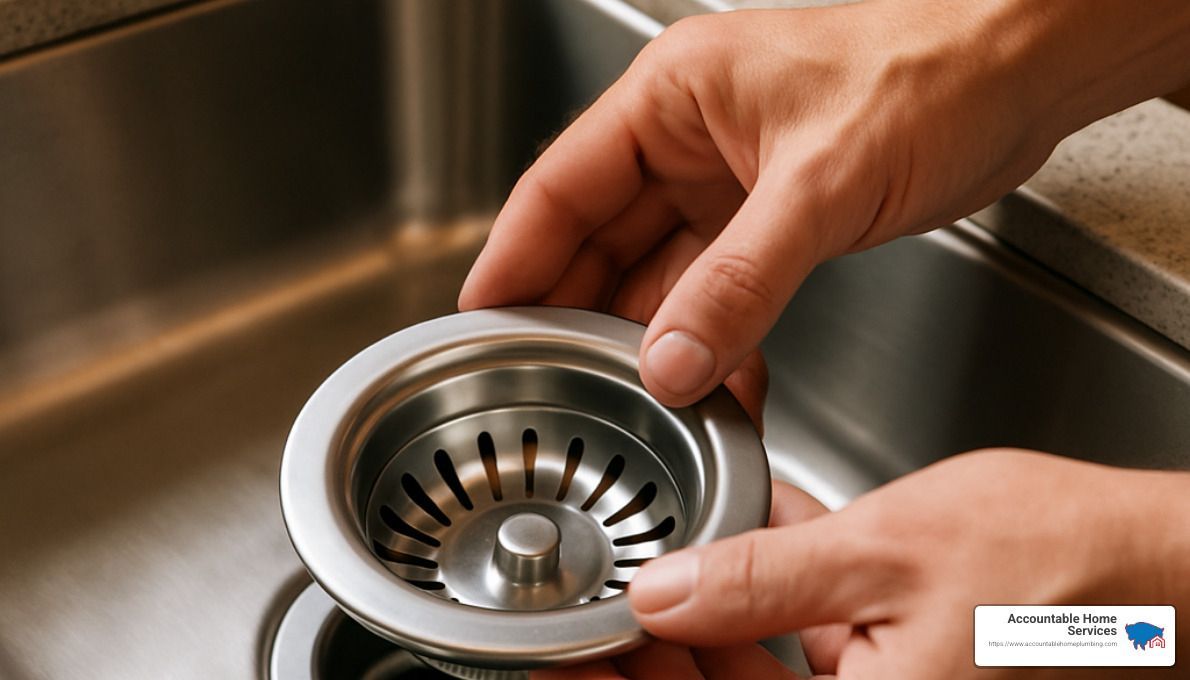
Everyday Habits That Keep Pipes Clear
You don't need to be a plumbing expert to keep your drains flowing freely. Small changes in your daily routine can make a world of difference in preventing those frustrating clogs from forming in the first place.
In your kitchen, start by wiping greasy pans with paper towels before washing them. That bacon grease might seem harmless going down the drain, but it's secretly plotting to solidify and create a stubborn blockage. A simple sink strainer can be your best friend here – catching food particles before they become tomorrow's clogged drain solutions emergency.
"I tell all my customers that what they do every day matters more than any fancy product they can buy," says Mike from Accountable Home Plumbing. "Just keeping coffee grounds out of your sink can prevent dozens of service calls each year."
Those "flushable" wipes in your bathroom? They're not nearly as flushable as the packaging suggests. Despite what the label says, these wipes don't break down like toilet paper and are notorious for causing serious blockages. Speaking of bathrooms, a simple hair catcher in your shower drain can prevent the most common bathroom clog culprit. Brushing your hair before showering also helps capture loose strands before they can wash down the drain.
Your laundry room needs attention too. Cleaning lint traps regularly isn't just a fire safety measure – it prevents all that fuzzy material from clogging your washing machine discharge hose. Installing a lint catcher on that hose provides an extra layer of protection. Also, using the recommended amount of detergent (rather than thinking "more is better") prevents soap buildup that restricts water flow over time.
Long-Term Maintenance Schedule
Establishing a regular maintenance routine is like giving your plumbing system a health plan. With consistent care, you'll catch small issues before they become major problems.
Monthly maintenance should include pouring boiling water down kitchen drains to dissolve any developing grease buildup. This five-minute task can prevent hours of future headaches. Adding enzymatic cleaners to all drains once a month provides a gentle, preventive treatment that keeps organic matter from accumulating. While you're at it, take a moment to check and clean sink stoppers and strainers – you might be surprised at what's collecting there!
Quarterly care steps up your prevention game. Using a drain snake every three months helps remove any debris that's starting to build up but hasn't yet caused a noticeable clog. This is also the perfect time to inspect visible pipes under sinks for any signs of leaks or corrosion. A simple mixture of hot water and dish soap run through kitchen drains can help maintain smooth flow through the pipes that see the most food residue.
Annual maintenance is your plumbing system's yearly checkup. Consider scheduling a professional inspection of your main sewer lines, especially if you have older pipes or trees near your property. Fall is the perfect time to check outdoor drain clean-outs for proper function before winter arrives. And giving all drains a thorough enzyme treatment before the cold season can prevent issues during those months when a plumbing emergency is especially inconvenient.
"We often see customers who could have avoided a $300 emergency call with just a few dollars of preventive maintenance," notes our team at Accountable Home Plumbing. "Regular maintenance truly is the fountain of youth for your pipes."
Think of your plumbing system like your car – regular oil changes prevent engine failure, and regular drain maintenance prevents plumbing disasters. A little attention now saves a lot of trouble later. By incorporating these simple habits and maintenance schedules into your routine, you'll spend less time searching for clogged drain solutions and more time enjoying your properly functioning home.
When to Call a Professional + FAQs
Let's face it – some drain clogs are simply beyond the reach of household remedies. As much as we'd all like to save money with DIY solutions, recognizing when it's time to call in the professionals can actually save you time, frustration, and even money in the long run.
Do You Need Professional Clogged Drain Solutions?
You've tried the plunger. You've deployed the baking soda and vinegar. Maybe you've even braved a drain snake. But that stubborn clog just won't budge. Don't worry – this happens to the best of us, and it's exactly why professional plumbers exist.
It's time to call Accountable Home Plumbing when you notice:
Multiple drains clogging simultaneously – This isn't a coincidence. When several drains throughout your home start backing up at once, it typically indicates a problem in your main sewer line rather than individual drain pipes.
Water backing up in unexpected places – If flushing your toilet causes your shower drain to gurgle or your sink to fill with water, you're dealing with a serious blockage that's forcing water to find alternative escape routes.
Recurring clogs despite clearing them – When you find yourself repeatedly unclogging the same drain, something deeper is likely causing the issue – perhaps tree roots, pipe damage, or severe buildup beyond your reach.
Persistent sewage odors – That unmistakable rotten egg smell lingering even after you've cleared visible clogs often indicates a blockage in your sewer line that's allowing gases to seep back into your home.
Strange pipe sounds – Gurgling, banging, or bubbling noises from your drains are your plumbing system's way of crying for help.
The professionals at Accountable Home Plumbing bring specialized equipment that makes quick work of even the most stubborn clogs:
Hydro-jetting technology uses concentrated water pressure to blast away years of buildup, grease, and debris without damaging your pipes. Video camera inspections allow plumbers to see exactly what's happening deep within your plumbing system, pinpointing issues with precision. Professional-grade motorized augers can reach blockages that consumer-grade snakes simply can't touch. And for the most serious cases, trenchless repair techniques can fix damaged pipes without turning your yard into an excavation site.
"When we arrive at a home with drain issues, we often find that the homeowner has been battling the same clog for weeks," says Mike Martinez of Accountable Home Plumbing. "Within an hour, we can usually solve problems that would take DIYers days of frustration."
For Denver Metro residents, Accountable Home Plumbing provides 24/7 emergency services because plumbing emergencies rarely happen at convenient times.
Frequently Asked Questions about Clogged Drain Solutions
Q: What should I try first for a slow drain?
Start with the simplest approach – for metal pipes, carefully pour boiling water directly down the drain. If you have PVC pipes, use very hot (but not boiling) water instead to avoid damage. If that doesn't work, the baking soda and vinegar method is your next best option, followed by plunging if necessary. Addressing slow drains early often prevents complete blockages later.
Q: Are chemical drain cleaners safe for septic systems?
Most chemical drain cleaners are actually harmful to septic systems. These harsh chemicals kill the beneficial bacteria your septic tank needs to break down waste properly. Instead, choose enzymatic cleaners specifically labeled "septic safe." These biological solutions work with your septic system rather than against it.
Q: Can drain cleaners damage my pipes?
Unfortunately, yes. Repeated use of chemical cleaners can be particularly damaging. The heat generated by these chemicals can warp PVC pipes, while the caustic ingredients can corrode metal pipes over time, potentially leading to leaks or complete pipe failure. This is precisely why professional plumbers typically recommend gentler methods first.
Q: How often should I clean my drains preventively?
Prevention is always easier than cure when it comes to clogged drain solutions. For most households, a monthly hot water flush helps keep minor buildup at bay. Additionally, treating your drains quarterly with enzyme-based cleaners helps break down organic matter before it can form serious clogs. Homes with known issues or older plumbing systems might benefit from more frequent maintenance.
Q: Why does my kitchen sink clog more often than other drains?
Your kitchen sink handles a perfect storm of clog-causing materials – cooking grease, food particles, coffee grounds, and soap residue all combine to create stubborn blockages. Installing a quality sink strainer and being mindful about what goes down your drain (especially avoiding pouring cooking grease and oil) can dramatically reduce kitchen sink clogs.
Q: Is it safe to use a plunger after using chemical drain cleaners?
This is a definite no. Plunging after using chemicals can cause dangerous splashback, potentially getting harmful chemicals on your skin or in your eyes. If you've used a chemical cleaner, flush thoroughly with water and wait at least 24 hours before attempting to plunge the drain.
Q: What's the difference between a sink plunger and a toilet plunger?
Though they might look similar at first glance, these tools are designed for different jobs. Sink plungers have a flat rubber cup that creates suction against the flat surface around sink drains. Toilet plungers feature an extended flange that fits into the toilet drain opening for better sealing. Using the correct plunger makes a significant difference in effectiveness – the wrong type simply won't create the necessary suction to clear the clog.
At Accountable Home Plumbing, we've seen it all when it comes to drain clogs throughout the Denver Metro area. Whether you need a quick fix for a stubborn blockage or want to set up a preventive maintenance plan, our team is ready to help with honest advice and upfront pricing – no surprises, just solutions. Check out our Drain Cleaning services or our Emergency Repairs page for more information, or browse our comprehensive FAQs section.
Conclusion
Let's face it—dealing with clogged drains can be incredibly frustrating. But armed with the right clogged drain solutions and a little knowledge, you can handle most common blockages quickly and effectively without breaking the bank.
When tackling a clog, remember to work your way up from simple to more complex solutions. Start with that hot water flush or the trusty baking soda and vinegar combo before reaching for mechanical tools like your plunger or drain snake. For slower but gentler treatment, enzymatic cleaners are your friend—especially if you have a septic system. Only use those harsh chemical cleaners as a last resort before calling in the professionals.
The truth is, an ounce of prevention truly is worth a pound of cure when it comes to your drains. Those simple mesh drain guards in your shower can save you hours of frustration down the road. Being mindful about what goes down your drains—keeping grease in the trash, not the sink—makes a world of difference. And that regular maintenance schedule we talked about? It's not just busy work—it genuinely keeps your plumbing system healthy and functional.
Here at Accountable Home Plumbing, we understand that some clogs simply won't budge no matter what you try. That's when our team of experienced professionals steps in. We proudly serve the entire Denver Metro area—from Broomfield to Westminster, Thornton to Northglenn, Arvada to Boulder, and Denver to Longmont—with our 24/7 emergency service.
What sets us apart? Our commitment to transparency. When you call us, you'll get upfront pricing with absolutely no hidden fees or surprise charges later. That's our promise to you.
Whether you're facing a stubborn clog that's resisting all your DIY efforts or you'd like to schedule that smart preventive maintenance we've been talking about, we're just a phone call away. Our team will ensure your drains stay clear and your plumbing system functions flawlessly throughout the year.
When it comes to your home's plumbing, a little attention today prevents major headaches tomorrow!

